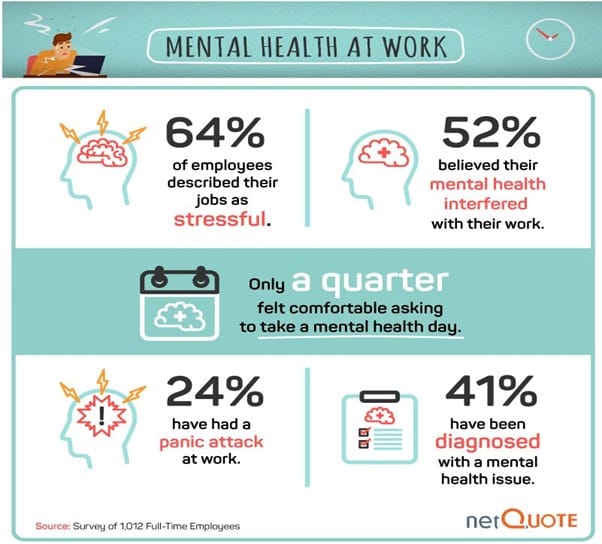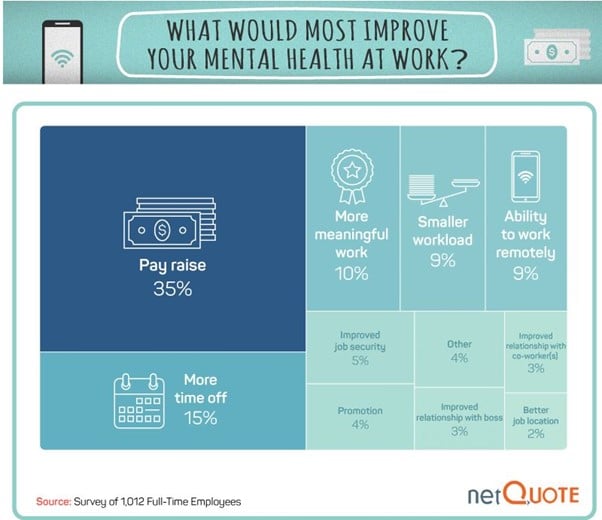Boundaries and work: Setting boundaries is self-discipline and self-control. Setting boundaries at work is not just a nice-to-have; it’s essential for maintaining mental health and ensuring a productive work environment. While work can be beneficial for our mental well-being, a toxic workplace can lead to serious physical and mental health issues.
As a Clinical Psychologist and Employee Assistance Program (EAP) consultant, I’ve seen firsthand how a lack of boundaries can create chaos in the workplace, leading to management disputes, coworker rivalries and job dissatisfaction. Let’s dive into why boundaries matter and how they can transform your work life.
The importance of boundaries in the workplace
Mental health and work
Work can be a source of fulfilment and purpose, but it can also be a breeding ground for stress and anxiety if boundaries are not established. Studies have shown that burnout is closely linked to depressive disorders, with severe burnout increasing the risk of major depressive disorder. This is a wake-up call for all of us!
Consequences of a negative work environment
A negative work environment can lead to burnout, anxiety and even depression. When employees feel overwhelmed and unsupported, it can create a vicious cycle of stress and dissatisfaction. Setting boundaries is a proactive way to combat these issues and promote a healthier workplace.
Common problems arising from lack of boundaries
Problem 1: Taking ownership too quickly
Many of us have been there – taking on responsibilities that aren’t ours because we want to help or avoid conflict. This can lead to resentment and burnout.
Case example:
Joyce and Paul work together for a small company that plans training sessions for industry. Joyce is responsible for booking the training sessions and managing the speakers’ schedules. Paul is responsible for the training facilities. He takes materials to the site, set up the equipment, and orders the food. Together Joyce and Paul make the events happen. However, Joyce started to feel exhausted and stress out because she keeps receiving request from Paul or doing him a “little favor” by “picking this up for me while you’re out”, “ordering coffee/tea for trainees when you come in”; or “bring this box of materials to the workshop”. Slowly, Paul was shifting his responsibilities onto Joyce. Joyce is struggled with the requests and having difficult to say “no” because she does not want to ruin the trainer’s and trainee’s experience in the workshop
Joyce is puzzled and feels stuck “But what if things go wrong for the workshop?”
Therapist: “Then they will get Paul to be accountable for the consequences since this is not your responsibility”
Joyce: “But what if Paul get angry with me for not helping?”
Therapist: “Then let him be. His anger can’t hurt you as much as his poor work habits can.”
If you find yourself saddled with someone else’s responsibilities and feel resentful, it’s essential to take ownership of your emotions. Recognize that your unhappiness stems primarily from within and is not solely your coworker’s fault. Instead of blaming them for their habits or behaviours, take action to address your feelings. In any boundary conflict, it’s crucial to first assume responsibility for yourself by establishing clear limits and saying no. If your coworker reacts with anger to your refusal, remain firm about your boundaries while showing empathy for their feelings. Maintain emotional distance and say, “I’m sorry if this upsets you, but that task is not my responsibility. I hope you can plan better next time so it works out.” If they continue to argue, avoid the trap of justifying why you can’t take on their work. This line of thinking may lead you to feel obligated to help simply because you can, and they may try to convince you otherwise. Remember, you owe no one an explanation for declining tasks that aren’t yours to manage.
Remember that being kind and helpful by giving favors and sacrifices are part of the life for your loved ones. Enabling is not. Learn to distinguish between the two by evaluating whether your generosity is helping someone improve or hindering their growth? We must take responsible action regarding those we support.
Problem 2: Working too much overtime
Working overtime occasionally is one thing, but making it a habit can lead to burnout. It’s crucial to set limits on how much extra work you’re willing to take on. Remember, “poor planning on your part does not constitute an emergency on my part.”
Remember that your job overload is your responsibility. Stop being the victim of an abusive situation and start setting limits with your bosses and co-workers. Jobs should have clear descriptions of duties and qualifications. Here are some suggested steps you may wish to take
- Set boundaries on your work by deciding how much overtime you ae willing to do. Some overtime during seasonal crises may be expected of you, so understand these expectations from your bosses.
- Review your job descriptions and evaluate the time needed to complete your work. If none exists, please discuss with your supervisors or company.
- Make a list of the tasks you need to complete in the next month. Make a copy of the list and assign your own priority to each item. Indicate on this list any tasks that are not part of your job descriptions.
- Make an appointment with your boss to discuss your job overload. Show your boss the list of tasks you need to complete in the next month and ask your boss to prioritize the tasks with you. If your boss wants all the task done and you cannot complete these tasks in the time you are willing to give, your boss may need to hire temporary help to complete those tasks. If your boss has unreasonable expectations of you, you may wish to take along an appropriate coworker from your personnel department (i.e., HR) to discuss necessary actions to take before you get burnout. If your boss continues to be unreasonable, you may need to begin looking for other job opportunities within or outside your organization; you may take trainings or night classes to open up other opportunities; you may need to chase down employment ads, invest more time in professional networking, and polish up your resume. Whatever you do, remember that your job overload is your responsibility. If your job is driving you crazy, you need to do something about it. All changes involve risk in our life, changes without risk does not exist; only you could be responsible for your emotionally well-being, so identify and understand your priorities and take actions.
Problem 3- Misplaced priorities
Effective workers focus on what’s important. If you find yourself sidetracked by less important tasks, it’s time to reevaluate your priorities. Ask yourself, “What truly matters?”
Ponder and realize how much time and energy you have and manage your work accordingly. Know what you can do and when you can do it, and say no to everything else. You might feel like you’re doing a great job but your boss is upset because essential goals are not being met. Then you start to feel unappreciated and resentful because you have put out so much effort. Thus, say something like this to your coworker or boss “if I am going to do A today, I will not be able to do B until Wednesday, does that align with your expectation? Or do we need to rethink which one I need prioritize working on?”
Tips: Say no to the unimportant, and say no to the inclination to do less than your best. If you are doing the best work on the most important things, you will reach your goals.
Set time limits for work. Understand and realize your limits, make sure you do not allow work to control your life. Having a limit will force you to prioritize. If you make a commitment to spend only certain hours a week on work, you will spend those hours more wisely because you have to plan ahead. If you think your time is limitless, you may say yes to everything.
Problem 4: Difficult co-workers and critical attitudes
Stress often stems from difficult co-workers. Remember, you can’t change others, but you can change how you react to them. Set emotional boundaries and don’t internalize their negativity.
Always remind yourself about the Law of power: You only have the power to change yourself. You can’t change another person. To see another person as the problem to be fixed is to give that person power over you and your well-being. Because you cannot change another person, you are out of control. The real problem lies in how you are relating to the problematic person. You are the one in pain, and only you have the power to fix it. So, think about this
- Stress is often caused by working with or for someone who is supercritical. People will get hooked into either trying to win over the critical person, which can almost never be done, or allowing the person to provoke you to anger. Don’t internalize the criticism and get down on yourself. Say this to yourself: “This person has no power over me. I won’t allow myself to give this person power to do so. I don’t want to spend more time thinking about this person and spoil my day further.”
- Allow these critical people to be who they are, but keep yourself separate from them and do not internalize their opinion of you. Make sure you have more accurate appraisal of yourself, and disagree internally about the appraisal of this critical person. “This is just his opinions, not the fact about who I am”
- Or you can follow your organization’s grievance policy to report on this person’s poor and negative behaviors with the relevant parties or authorities.
- Set physical or emotional boundaries: You can’t control their opinions, feelings or behaviors towards you, (just like they cannot control your opinions, feelings and behaviors towards them), but you can choose to limit your exposure to them, either physically or emotionally distancing yourself. This is self-control.
- Avoid gaining approval and recognition or strong feelings of competition with a coworker. Trying to gain the approval from supercritical person or trying to win over a co-worker will never work, and you will only feel controlled. If gaining approval or feelings competitive is related to your childhood unfinished business or unresolved hurt from past authority relationships such as parents or teachers or sibling rivalry (i.e. transference relationship), seek psychotherapy to help you re-process and cope with them. If you start to repeat the old patterns you exhibited with your parents or authority figures from the past, it will never yield positive results. You become a “child” on the job and act immaturely or impulsively that come with poor consequences.
Problem 5: Expecting too much from work
Many people look to their workplace for emotional support, which can lead to disappointment. It’s essential to recognize that work is not a substitute for family or personal relationships.
The workplace ideally should be supportive, safe and nurturing but this atmosphere should primarily support the employee in work-related ways: to help them learn, improve and get the job done. The problem arises when someone wants the job to provide what his parents or family did not provide for him: primary nurturing, identity, relationship, self-esteem and approval. Workplace is not set up for this, nor does it align with the typical job requirements. The inherent conflict arises from this situation: the job demands adult-level functioning, while the individual seeks to fulfill childhood or interpersonal needs. These conflicting expectations are bound to lead to problems and tensions within the workplace.
Boundaries shape our identity and clarify what belongs to us and what does not. Remember, your job should not be the sole definition of who you are; you are much more than your profession. Don’t allow your work to dominate your life or dictate your sense of self. Keep work at the workplace and strive not to bring work-related stress into your home.
Some fun facts
Sources: https://www.netquote.com/health-insurance/mental-health-at-work
Sources: https://www.netquote.com/health-insurance/mental-health-at-work
This article is written by Dr Felice Soo* – IMC’s Principle Clinical Psychologist (Adult).
Dr Felice Soo works at IMC Camden and IMC Katong. To book an appointment to see her, please click here; or for enquiries please call (+65 6733 4440) or email the clinics:
Camden: [email protected]
Katong: [email protected]
*Dr Felice Soo is a psychologist with a doctoral qualification. She is dedicated to providing expert psychological services. However, it is important to clarify that she does not hold a medical or dental qualification. Her expertise lies in the field of psychology, and she is committed to delivering exceptional psychological care to support your well-being.







































